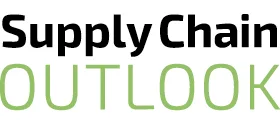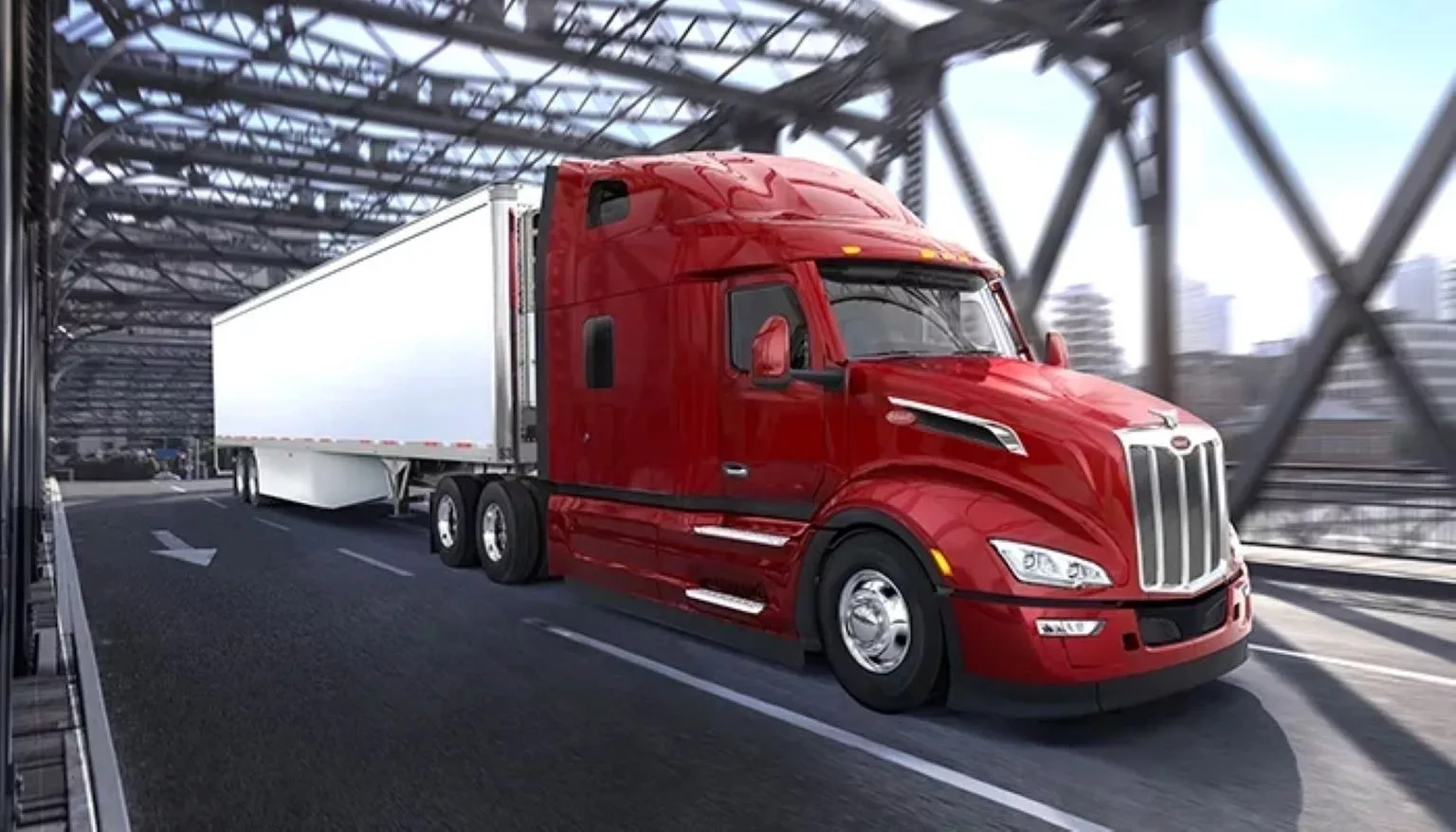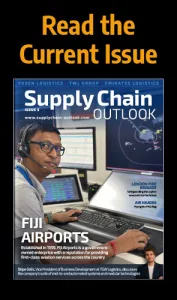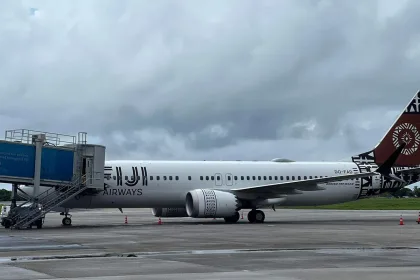PACCAR represents the latest in trucking transport in the US. We spoke to Debra Poppas, Vice President of Global Quality at PACCAR, about the company’s progressive mission to place innovation, sustainability, and people-centric values at the forefront of business.
INTRODUCTION
From the first Proto-Siberian inhabitants of the continent; hunter-gatherers who moved on foot via the once-existent Alaskan land bridge across the Bering Strait, to their North American descendants; the famously mounted indigenous tribes, and the colonial period that followed; a tale of wagons, explorers and gold trails, transporting supplies over the continent has been essential to the survival and continuation of humankind since the beginning.
Cut to the present, where evolving innovation has ushered onto us a century of technological solutions and continual advancements, we find that transport is at the fore of a new frontier: the growing switch from traditional and wasteful fossil fuels to progressive e-vehicles is setting a new standard for the sector. Vehicles guided by AI systems and automated control are now considered the norm in the realm of vehicle R&D. The widespread combination of technology, sustainability, community and high-performance is marking the future of the industry across the board.
This notion of industry progression is no better exemplified than by PACCAR – the company changing the face of American trucking transport.
Trucking is the lifeblood of the American economy. In the whole of the US, 74 percent of freight is transported by trucks, with rail and water-based transport making up another 11 and five percent (respectively).
The extensive network of roads crisscrossing the nation provide vehicular access to any one location, and with individual roads such as the mighty US Route 20 spanning a substantial 3,365 miles coast-to-coast, long-haul trucking becomes the most efficient and rewarding mode of resource transportation.
PACCAR embodies this. Increasingly efficient trucking capabilities and solutions provided by the firm stand it above and apart from its peers in the transport industry.
PACCAR is a global technology leader in the design, manufacture, and customer support of premium medium and heavy-duty trucks under the well-known nameplates Kenworth, Peterbilt and DAF. The company also designs and manufactures advanced powertrains, provides financial services, information technology and distributes truck parts related to its principal business.
The international company utilizes a host of distribution centers and dealership networks spanning multiple regions, including South America, Australasia, Europe and the Middle East, and of course, North America.
“This is a fabulous time to be working in the Commercial Vehicle space, particularly in the US,” says Debra Poppas, Vice President of Global Quality.
“December Class 8 orders were the fourth best ever and fourth-quarter cumulative orders were at number two all-time high.”
Poppas attributes this to the wide-reaching industry implications resulting from the COVID-19 pandemic – a catalyst for goods-related freight demand. In the face of this, PACCAR rose to answer the increase in freight demand enabling customers and clients access to the latest and best in quality, high-performance trucking vehicles.
Poppas has always had a passion for engineering-related hobbies and topics.
“Growing up, I was a bit of a math and science nerd,” she muses. “My keen interest in each subject led me to pursue a degree in engineering. It’s how I learned to design electrical circuits and manufacture them through semiconductor fabrication and design sites in the heart of central Indiana.
“But one of the reasons I was able to become the first female in my family to go to college, the first female to run engineering at Delphi Electronics, and the first female officer at Remy International, is because I had family, mentors, and sponsors who believed in me, and encouraged me to take the tough assignments – people who gave me a chance.”
Poppas began her career at General Motors (GM) as an 18-year-old college intern. She progressed through a multitude of positions, including those of Integrated Circuit Designer, Plant Manager, Vice President of Global Engineering, as well as working for two additional companies before her current position as Vice President of Global Quality for PACCAR.
“My first job was quality inspector of a radio assembly line,” she tells us. “I was checking the functionality and appearance of the radios. I had a scale and a clipboard, and I was examining over 100 jobs per hour during an eight-hour shift.
“That experience taught me that all details matter to ensure the quality of the product you are assembling. I participated in a General Motors co-op program that helped pay my college tuition, and within two years after I graduated, I was off to Purdue University (Indiana) to pursue a Master’s in Electrical Engineering, sponsored by GM.”
Now Poppas oversees PACCAR’s quality management worldwide and has had the pleasure of witnessing first-hand the company’s evolution to the present.
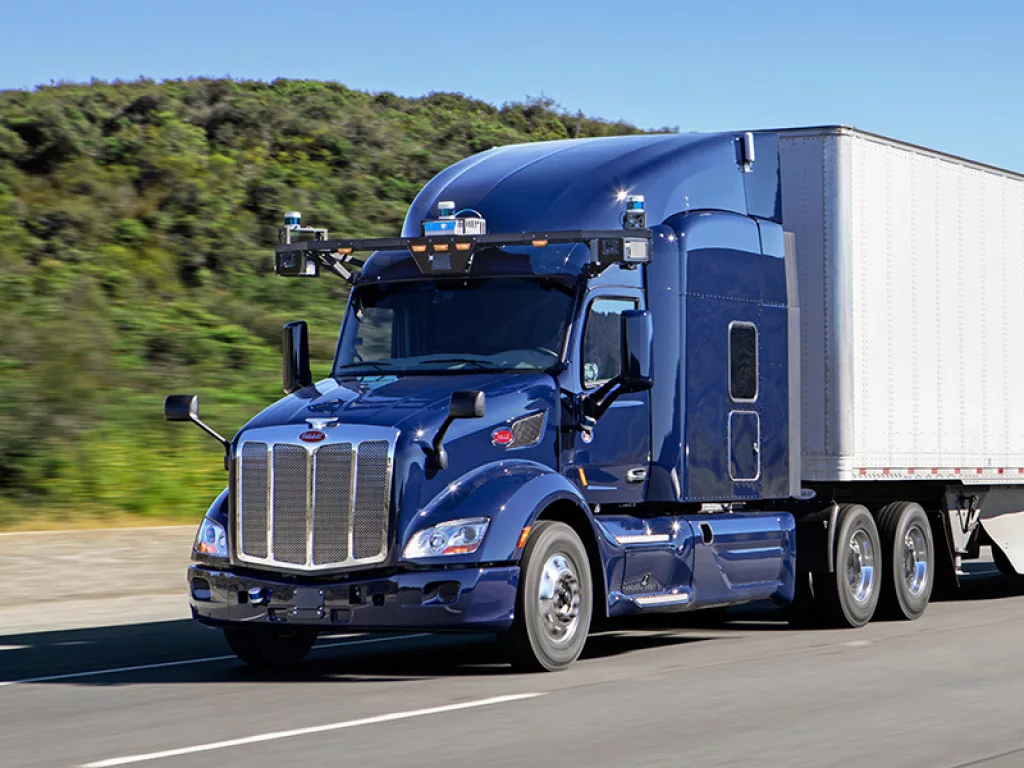
INNOVATION AND ENVIRONMENT AT PACCAR
In all aspects of its operations, PACCAR ensures the promotion of sustainable alternatives to the traditional fossil-fuel-based trucks that make up the majority of those in use, as well as innovative technologies in the field.
PACCAR’s movement towards electric vehicles is embodied by a fuel cell electric Kenworth T680 and battery electric Peterbilt 579EV, that recently became the first Class 8 zero-emissions vehicles to drive to the 14,115-foot summit of Pikes Peak in Colorado.
“The trucks handily negotiated the famous Pikes Peak International Hill Climb course. Both vehicles displayed superb power and exhibited excellent drivability over the 156 turns and switchbacks during the 4,700-foot elevation gain to the summit,” Poppas elaborates.
The Kenworth T680 fuel cell electric vehicle offers 470 horsepower and a 350-mile range with a 15-minute refill time. Kenworth and Toyota Motor North America are collaborating on a project to develop Kenworth T680 zero emissions trucks powered by hydrogen fuel cell electric powertrains.
“The Peterbilt 579EV that climbed Pikes Peak is designed for optimal weight distribution and performance. The fully integrated, electric powertrain uses thermally-controlled Lithium Iron Phosphate battery packs and can be quickly recharged, making the 579EV ideal for regional haul, port, pickup/delivery and last mile operations.”
PACCAR’S nameplates Kenworth, Peterbilt and DAF are leading the industry with more than 60 hybrid and zero emissions vehicles in customer testing, which have traveled almost 500,000 miles collectively. Kenworth K270E and T680E, Peterbilt 579EV, 220EV, and 520EV and DAF CF Electric zero emissions trucks became available for customers to order in the third quarter of 2020. PACCAR’s electric vehicle production will proceed in the second quarter of 2021.
“In addition, PACCAR is providing charging infrastructure solutions for customers who purchase battery electric Kenworth and Peterbilt trucks in the US and Canada,” Poppas tells us.
“Kenworth and Peterbilt customers and dealerships are able to order electric chargers from PACCAR Parts. PACCAR Financial offers flexible financing options and PacLease bundles the cost of charging systems with full-service lease.”
The latest innovations within the electrical vehicle sphere go hand-in-hand with advanced automated driving technologies.
In January 2021, PACCAR and Aurora (a leader in autonomous driving technologies) formed a global strategic partnership to develop autonomous Peterbilt 579 and Kenworth T680 trucks. PACCAR’s autonomous vehicle platform will be integrated with the Aurora self-driving technologies. PACCAR customers will benefit from the autonomous vehicles’ enhanced safety and operational efficiency. Kenworth T680 and Peterbilt 579 trucks utilizing the Aurora Driver are expected to be delivered in the next several years.
The partnership between PACCAR and Aurora, a Silicon Valley-based autonomous-driving company with relatively new beginnings, will allow for the development and commercialization of the technology required for the safe autonomous hauling of large freight on US highways. Part of Aurora’s reasoning being that transporting freight autonomously is one of the favored forms of transport with which to incorporate self-driving technologies, due in part to the straightforward and worthwhile mission of delivery tasks – driving from start to finish along lengthy yet navigable routes for AI systems.
This agreement is a global one, and Aurora’s focus will be on testing software, sensors and computing systems on the Peterbilt Model 579 and Kenworth T680. The testing will also include evaluation of the performance of the vehicles, both on-highway and at PACCAR’s R&D center in Mount Vernon, Wash.
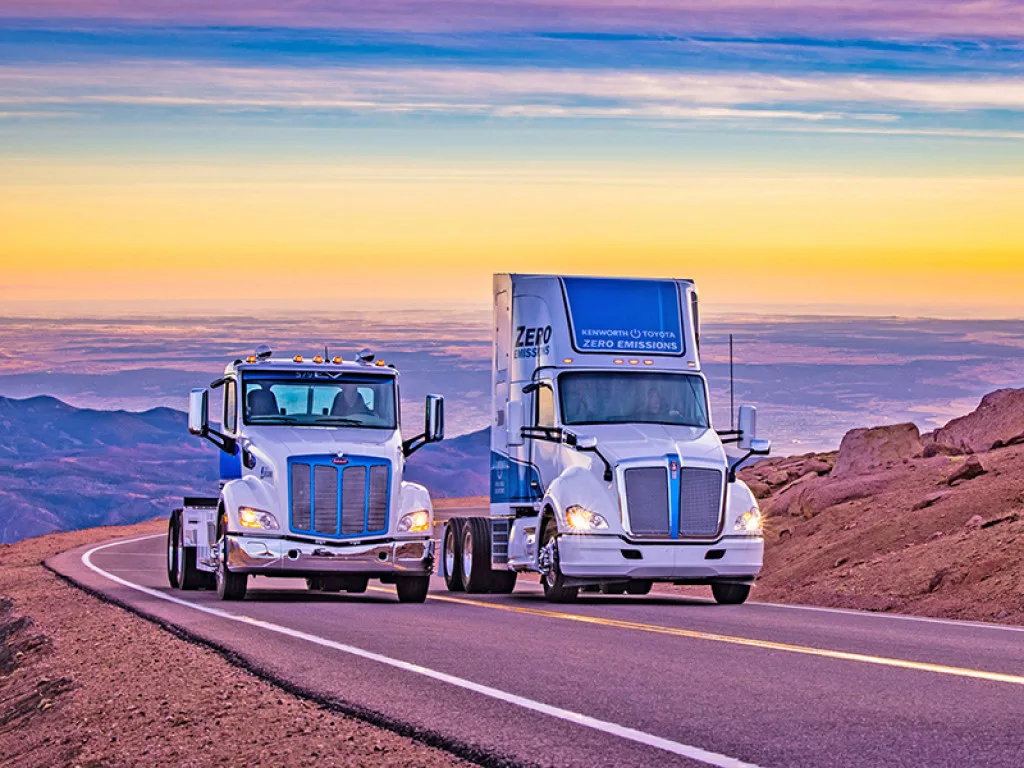
WORKING TOWARDS NATURE AND COMMUNITY
Resulting from this support for sustainability-centered business, PACCAR has been honored as a global leader in environmental practices by reporting firm CDP, earning a score of “A-” in 2020, which places PACCAR in the top 15 percent of reporting companies worldwide.
Over 9,500 companies disclose data about their environmental programs to CDP for independent assessment, and environmental leadership is one of PACCAR’s core values – an aspect that the firm is very proud of.
“PACCAR reduced greenhouse gas emissions by 38 percent across its global facilities from 2013 to 2019,” Poppas informs us.
PACCAR announced that it will establish new emissions reduction targets in partnership with the Science Based Targets initiative (SBTi). SBTi works with more than 1,000 companies worldwide to create a clearly defined path to reduce greenhouse gas emissions, with the goal to help limit global warming to below two-degrees Celsius compared to pre-industrial levels.
“We are an environmental leader in global factory operations, with over 80 percent of our manufacturing facilities being zero-waste-to-landfill, and over 90 percent being ISO 14001 certified. Even our vehicles are over 80 percent recyclable, with steel, aluminum and copper components.”
On top of this, PACCAR and the PACCAR Foundation has made more than $200 million in grants around the world for education, social services, and the arts to enrich the communities in which its employees live and work. The PACCAR Foundation is a private foundation formed in 1951. The Foundation usually directs its grants to organizations in those communities within the service area of a significant PACCAR presence, such as a factory or a major office.
“The company has recently contributed $1.5 million to nonprofit organizations that promote diverse and inclusive communities, including UNCF, Special Olympics USA Games, YWCA, Landesa, Northwest African American Museum and Lighthouse for the Blind,” Poppas tells us.
Grant recipients usually include United Way, universities, hospitals, and programs for art-related and economic education. The balance of the Foundation’s grants is normally reserved for capital campaigns involving acquisition or improvement of facilities used for social and health services, education and cultural affairs.
A foundational belief guiding PACCAR’s philanthropy is that with a strong education, people have a life full of opportunities. PACCAR is proud of its generous grants to universities, which use the funding to provide scholarships, fund research in science and business disciplines, and build world class facilities for students and faculty.
To prepare school-age children for the skills to succeed in the 21st century workforce, PACCAR and its many committed employee volunteers support literacy programs to purchase books for children in need and contribute funds and time to education programs in economics, science and business through Junior Achievement and similar programs that supplement school curricula.
Ensuring that communities have quality health care technology and services is a major priority for PACCAR philanthropy. PACCAR funds community hospitals and provides dental services for those in need. PACCAR made a significant donation to Cancer Research UK to build a world class cancer research facility that will support the communities near PACCAR’s Leyland factory in Lancashire, UK.
Strong communities assist those less fortunate with a range of social services. PACCAR and its employees are proud to be long-standing supporters of United Way organizations across the United States. Over the past five years, PACCAR has donated $6.2 million and PACCAR employees have contributed many volunteer hours to United Way organizations.
As the organization extends its global reach, it has expanded its philanthropic leadership to support emerging economies. PACCAR’s donation to Sightlife, an eye bank, brought the latest surgical equipment to India to improve the success rate of corneal transplants for blind people across India, and to provide funding for hundreds of eye surgeries in the nation’s city of Pune.
“During the course of 2020, PACCAR and its employees donated over $2 million to assist communities impacted by the COVID-19 pandemic,” Poppas informs us.
The company’s diversity councils operate throughout PACCAR’s global businesses. The diversity councils’ goals are to enhance business success through diverse and inclusive workplaces. The PACCAR Women’s Association seeks to increase women in PACCAR leadership roles by providing educational, networking and mentoring opportunities to employees at all levels.
“PACCAR, Kenworth, Peterbilt, PACCAR Parts and Dynacraft were each honored by the Women in Trucking Association as a 2020 Top Company for Women to Work for in Transportation,” Poppas explains.
“We are committed to hiring and promoting the most talented people in the world and we know that the best people represent the diversity present in the global community.”
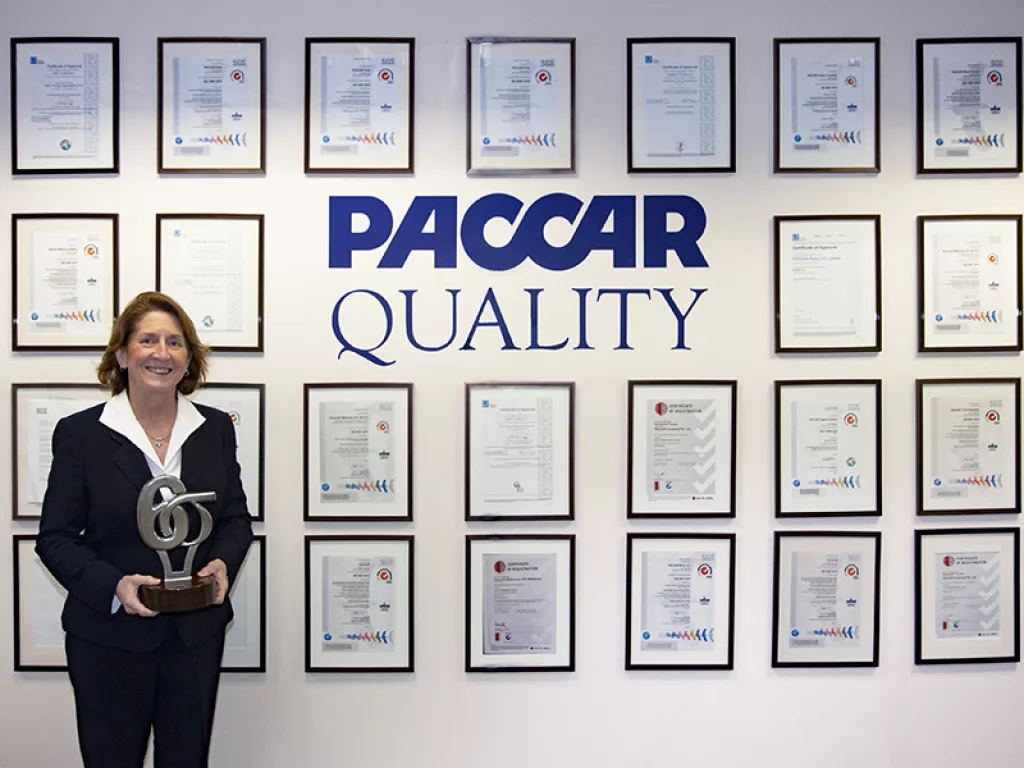
PEOPLE-CENTRIC BUSINESS
One factor that truly makes PACCAR the company it is are the hard-working and skilled employees across all the company’s departments. Its employee-centric operation helps each individual feel like their own boss at the same time as sharing a communal sense of company achievement.
“As the commercial vehicle quality leader, we have world-class employees,” Poppas informs us.
“We have a well- established Six Sigma training program that includes lean belt, green belt, black belt and design for Six Sigma open to employees, suppliers and customers. We have trained more than 15,000 people globally.”
PACCAR is a member of the Automotive Industry Action Group (AIAG) which provides cost- effective training and collaboration opportunities with other OEM’s for best practices and knowledge sharing. In addition, we actively network and benchmark with leaders in other industries through Manufactures Alliance for Productivity and Innovation (MAPI’s) quality council, Conference Board Quality Council and Gartner Quality/Supply Chain.
“We developed individualized training plans for our global supplier quality mangers to improve skillsets and effectiveness in working with our suppliers,” Poppas tells us.
“This includes the American Society for Quality (ASQ) certification for quality engineers for 100 percent of our supplier quality managers.”
On top of this, another side to the company’s success are the many business partners that make up the smooth and efficient operation of the supply chain.
“PACCAR works closely with our supplier partners to ensure that our products are the highest quality and most efficient to manufacture,” Poppas elaborates.
“PACCAR relies on excellent suppliers to build industry-leading quality Kenworth, Peterbilt and DAF trucks. To achieve elite 10 ppm status, PACCAR’s outstanding suppliers need best-in-class product design and process capabilities, and just as important, a quality-focused culture. Our focus on excellent supplier performance ensures PACCAR products are the highest quality in the Commercial Vehicle industry.”
The company annually recognizes suppliers who exceed PACCAR’s “10 ppm” quality standard, or the equivalent of 10 defective parts for every million components shipped to PACCAR. Over 51 percent of company suppliers exceeded that target in 2020. To qualify, suppliers must also meet demanding criteria for delivery performance, warranty support and continuous improvement. In 2020 alone, PACCAR recognizes 369 suppliers in 27 countries on five continents for achieving this high level of quality performance.
This recognition of its top performing suppliers occurs through its comprehensive Supplier Performance Management (SPM) program. This honor is given to suppliers that reach the SPM Master, Leader and Achiever status. The SPM program drives collaboration and continuous improvement between PACCAR and its suppliers, which leads to performance enhancements and product innovations.
“The SPM program evaluates a supplier’s performance in the areas of product development, operations support and business alignment with PACCAR objectives,” Poppas explains.
“Suppliers and PACCAR Quality work together to increase delivery performance, warranty support, and continuous improvement. Suppliers should bring us product innovations; have global capabilities and have local market support. Vehicle integration with our systems at the lowest total cost and strong aftermarket support is paramount. We expect our suppliers to be profitable, so they are able to invest in their business and product innovations, with succession plans that support their long-term viability and our business over time.”
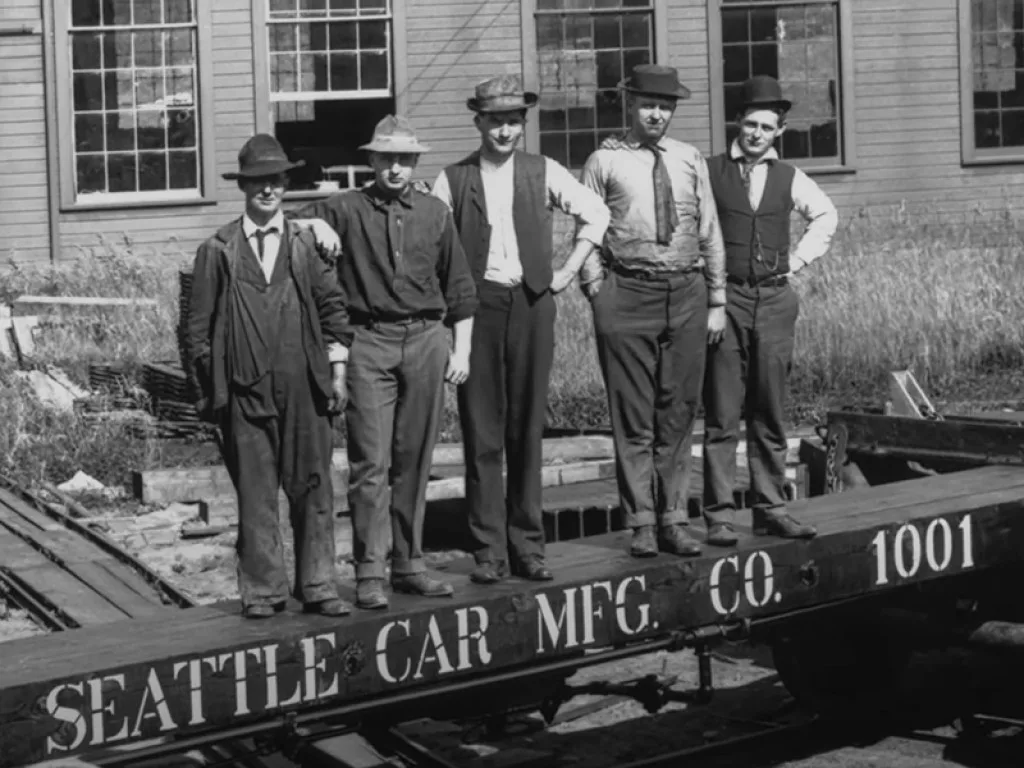
A HISTORY OF ACHIEVEMENT
PACCAR conducts its business to achieve above-average market returns for stockholders, reflect the highest ethical standards, fulfill its legal obligations, and meet its social responsibilities. The company strives to gain the favorable regard of customers, shareholders, employees, regulatory authorities, and the general public through superior performance and effective communications.
PACCAR’s ESG approach is focused on environmental leadership, social responsibility, ethical business conduct, and corporate governance practices that enhance shareholder value.
The ESG disclosures in this report (found at paccar.com) are consistent with the SASB Industrial Machinery and Goods Sustainability Accounting Standard Version 2018-10.
To understand PACCAR’s current standpoint, ethos, production quality and success, we can look no further than its history throughout the 20th century.
In 1905, William Pigott, Sr. founded Seattle Car Mfg. Co. to produce railway and logging equipment at its plant in West Seattle. The company later merged with Twohy Brothers of Portland to become Pacific Car and Foundry Company, a name it retained for the next 55 years. In 1924, William Pigott sold control of the company to American Car and Foundry Company.
Paul Pigott, son of the founder, acquired a major interest in the company from American Car in 1934. Under his leadership, the business expanded its products and services.
With its first major acquisition of Kenworth Motor Truck Company of Seattle in 1945, the company entered the heavy-duty truck market. Pacific Car and Foundry greatly expanded its heavy-duty truck capability with the purchase of Peterbilt Motors Company in 1958. And in 1966, Pacific Car and Foundry Company entered the Australian truck market with the establishment of a Kenworth Truck assembly plant near Melbourne.
Then, in the following decade, believing “Pacific Car and Foundry Company” no longer accurately reflected the Company’s products and activities, directors and shareholders voted to adopt PACCAR Inc as its new name in 1972. This paved the way for two major divisions of PACCAR to be founded in the following year: PACCAR International Inc, with headquarters in Bellevue, Washington, was formed to consolidate the sales and service of company products abroad, and PACCAR Parts Division was established in Renton to supply aftermarket parts sales.
With the acquisition of DAF Trucks N.V. in 1996, and Leyland Trucks in 1998, PACCAR was established as one of the major truck manufacturers in the world. DAF Trucks is a Netherlands based truck company with production facilities in Eindhoven, the Netherlands and Westerlo, Belgium. Leyland manufactures DAF trucks at its plant in Lancashire, England.
Moving into the 2000s, 2010 saw PACCAR unveil its PACCAR MX engine line for North America. While the MX engine was new to the North American market, DAF has been building engines in Europe since 1957. PACCAR invested $400 million in the PACCAR Engine factory and technology center in Columbus, Mississippi, to assemble its proprietary engines.
Within recent years PACCAR has grown substantially and laid roots in many different areas around the globe. On top of this, the firm has turned its focus to not only expansion, but also innovation across the board; an aspect of the company that remains increasingly important during this digital age.
2013 was the year PACCAR expanded its global operations with the opening of a new DAF factory in Ponta Grossa, Brasil. The company invested $320 million in the 300,000 square-feet assembly facility on 569 acres. The factory currently assembles the DAF XF and CF vehicles for the South American market. Following on from this in 2017 the company announced the opening of its Silicon Valley Innovation Center in Sunnyvale, California. The center coordinates next-generation product development and identifies emerging technologies that will benefit future vehicle performance.
And with 2020 came the introduction of a new age of innovation for the company. Kenworth T680 fuel cell electric vehicle and a battery electric Peterbilt Model 579EV became the first Class 8 zero emissions vehicles to drive to the 14,115-foot summit of Pikes Peak in Colorado. This year, PACCAR and Aurora established a strategic agreement to develop, test and commercialize autonomous Peterbilt and Kenworth trucks. This collaboration will integrate PACCAR’s autonomous vehicle platform with Aurora Driver technology.
From this past, PACCAR has risen to become a key player in the trucking transport industry and continues to supply its quality variants of trucks and positive ethos in the present and into the future.
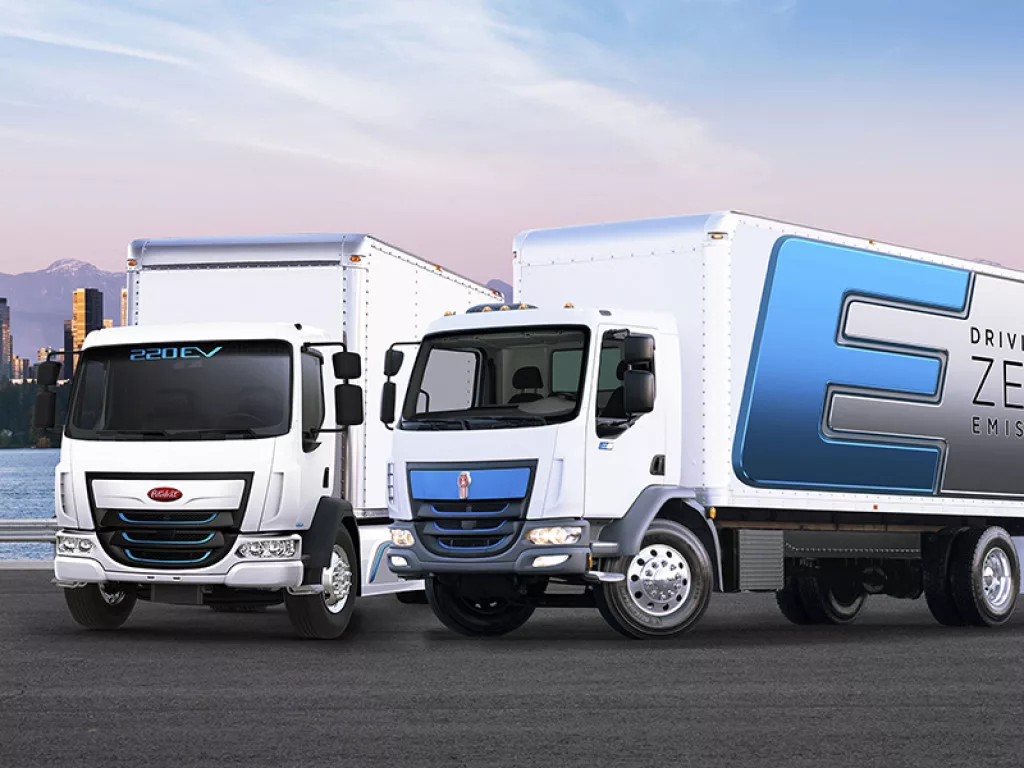
PACCAR INTO THE FUTURE
Now PACCAR stands at the beginning of a new frontier. A company that places innovation, sustainability and people-centric values first, PACCAR spearheads the trucking transport industry with a progressive attitude towards incorporating the latest technology and maintaining the best practices with regards to operational efficiency and limited environmental impact.
“Quality is the defining character of PACCAR products and is the bedrock of our success,” Poppas says, and ends by elaborating on the company’s future plans.
“As such, PACCAR is maturing its supplier software quality assurance process using a process capability assessment ASPICE. We are also maturing our Quality Management System for robust controls for electrification and autonomous technologies in a high-volume production environment that match commercial vehicle requirements for safety, functional performance, compliance, durability, and quality.
“Advancing problem-solving capability throughout the supply chain, expanding data analytics to anticipate and predict customer needs and equipping the organization with insights to make better informed decisions are the transformative quality initiatives underway. The challenge is to proactively and flexibly help the business respond to disruptive technology, rapidly shifting economic conditions and expanding supply bases.”
With a longstanding history dating back to 1905, PACCAR now represents the forward-moving development of the trucking transport industry across the US and several regions around the globe. Its innovative reach into the realm of electric vehicles has opened a whole new branch of possibilities for the company itself and its customers, and PACCAR’s continuing investments have given the company an ever-advancing foothold into the latest high-end self-driving technologies.
As it stands, and with the future, a highway laid bare for the company, it is more than fitting to say that it is worth keeping an eye on the progressive convoy that is PACCAR.
